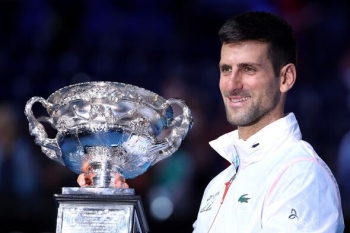
 Pachu Menon
Pachu Menon

Novak Djokovic, the 21-time Grand Slam singles champion, was not allowed to defend his Australian Open title in 2022 after a tumultuous 10-day legal saga over his COVID-19 vaccination status culminated with his visa being revoked on the eve of the tournament.
Speaking exclusively to the BBC sometime in February last year after the ‘snub’, the ace tennis player had said that he would rather miss out on future tennis trophies than be forced to get a Covid vaccine.
The top-rated tennis player said that he should not be associated with the anti-vax movement, but supported an individual’s right to choose.
“I was never against vaccination, but I have always supported the freedom to choose what you put in your body” was the statement the Serbian tennis player had made then.
“The principles of decision-making on my body are more important than any title or anything else. I am trying to be in tune with my body as much as I possibly can.” He thus defended his decision not to take the vaccine.
‘The Joker’ may have had the last laugh though!
The government’s two watchdogs have admitted to ‘multiple side-effects’ of Covid-19 vaccines that were administered to over a billion Indians in the past more than two years.
The startling revelations are made by the Indian Council of Medical Research (ICMR) and Central Drugs Standard Control Organization (CDSCO) in an RTI reply to a Pune businessman.
“In a specific query on the side-effects of all these jabs, they have cited a plethora of ramifications arising out of all these vaccines comprising their FAQs.”
In the wake of recent revelations by the government on the aftereffects of the Covid vaccinations, many people like the tennis ace seem justified in their refusal to get themselves vaccinated.
So, what are we to make of the strict government guidelines that made the ‘dual-jab’ mandatory for everything from working to travelling for people in the country!
Most of the states had made it mandatory for employees as well as their family members to take both doses of Covid-19 vaccine to access workplaces or industries.
At the same time, it is quite interesting to note that in response to multiple inquiries, the Ministry of Health and Family Welfare had clarified that ‘the vaccination for Covid-19 is voluntary and receiving the entire vaccine regimen is recommended for protecting oneself against the disease and limiting the transmission of the disease to close contacts such as family members and acquaintances.’
It is further stated that no government law or notification has been issued that allows employers to make it necessary for their employees.
“Hence entities cannot make vaccination mandatory for their employees on legal grounds. To protect its already existing and vaccinated employees, the employer can include a term or condition in its new employment contract that requires new employees to produce their vaccination certificate as an obligatory document for employment.”
Now whatever one wants to make of this legal jargon, the simple fact is that the vaccination certificate, post-Covid, continued to be an ‘essential’ document for any and everything – at least for some months even after relaxation of the safety norms.
With threats of a fourth wave in the offing now, plans to revisit the restrictions imposed at the peak of the pandemic are apparently being mulled over once again.
Announcements in the media regarding the availability of the booster dose in government hospitals is a clear indication that the government will once again pursue the vaccination drive with an enthusiasm only evident with the resurgence in infections.
The vaccine is by no means a sure-cure against the viral attributes of the microbe.
It has been consistently claimed that the Covid-19 vaccines are for people who are moderately or severely immunocompromised. Those who have weakened immune systems are at an increased risk of COVID-19 illness and death.
But then the government authorities in the country have been conspicuous by their haste to push through with the vaccination drives whenever it has been announced.
It is claimed that the recently developed COVID-19 vaccines significantly reduce the risk of severe coronavirus disease. Moreover, efforts are on to impress the fact that widespread vaccination acceptance is of critical importance to society dealing with the continuing aftermath of the Covid-19 pandemic.
However, the latest and confirmed disclosures by authorities on the harmful after-effects of the vaccines appear to change the equation on Covid ‘arrest’ attempts altogether.
The miserable failure in gaining and enhancing public trust in COVID-19 vaccination notwithstanding, what made the government announce liberalized and accelerated strategy phases of the vaccination!
Admittedly, vaccine hesitancy has been one of the factors blamed for some countries not meeting their COVID-19 vaccination coverage targets, along with supply bottlenecks and shortages.
It would appear that most of the people who have either refused vaccines over concerns about vaccine developments being rushed or have said that they would rather wait and see, appear to be the prudent of the lot considering the after-effects which have become a cause of concern now.
It is true that very little is known about why individuals have shown a marked hesitancy to get inoculated.
One can’t deny that the reported side-effects of COVID-19 vaccines, which have been said to be mostly mild to moderate and lasting no longer than a few days, have been widely debated, deterring many from expressing their willingness to get vaccinated.
Even if the government goes into a denial mode, debates and animated conversations surrounding the hurriedly approved vaccines will persist.
However, despite the government announcement of a healthy percentage in the country having inoculated against the effects of the rampaging virus, it is the lesser quotient which abstained from getting vaccinated under one pretext or the other that has now presumably proved to be the wisest of the lot.